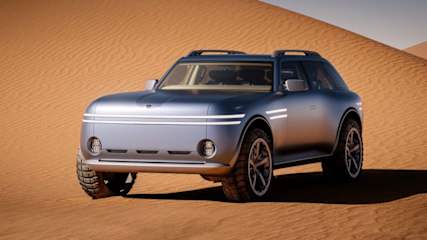Our buyers want 'something real': Why Chinese supercars like BYD's Yangwang U9 are dismissed by this historic brand, even as it develops its first all-electric car
By Stephen Ottley · 13 Apr 2025
Lamborghini has dismissed the potential sales threats posed by the likes of BYD and its Yangwang U9 electric supercar, despite the Chinese car industry shaking up the global established order.Speaking to Australian media at the local unveiling of the V8-hybrid Temerario supercar, Lamborghini CEO Stephan Winkelmann said he doesn’t see all-electric supercars as a serious challenge as they offer too many compromises.Which is why the Temerario and its bigger sibling, the V12 plug-in hybrid Revuelto, are both hybridised rather than opting for potentially more powerful electric motors. Winkelmann believes buyers are attracted to more than just pure power figures.“ No, we always said that the pure electric supercar are not here to be successful,” Winkelmann said. “Some already admitted it, and they're putting them out of the market, they're still trying to sell some, but it's not going to fly because of a lot of issues.“It's the brand, it's the residual value, it's the missing sound, a lot of things. But at the end of the day, what you want is something which is real.”Winkelmann is also confident that Lamborghini’s brand image and reputation crosses over boundaries and through generations, giving a truly global appeal and an especially strong one in the lucrative Chinese market. He made it clear this is no accident, and the Raging Bull brand is carefully curating its image and the next generation of buyers using all the latest technology and apps.“Yes, I hope it's like this because we are also very into social media now,” he said. “We have Instagram, TikTok, we are in the best position. So we have a lot of kids now which are loving us, and not only people which are having a driving license, but also the majority will never have the opportunity to own a Lamborghini."It's also important for us not only to have a, let's say, a good base for the next buyers, but also to have always thumbs up when a Lamborghini passes by now, which is easy to say, but you have to always be ahead of the wave.“You never know what is going to happen. So to have a large crowd of fan community is important and this is a huge difference of our type of luxury business. If you compare it with watches or with accessories or fashion. No, there is not this emotion. Sometimes yes, but mostly not.”However, how Lamborghini integrates this level of emotional appeal into its already-announced first electric car, a 2+2 GT car to join the Revuelto, Temerario and Urus, remains to be seen. When quizzed about the possibility of artificial engine noises for the electric Lamborghini, Winkelmann admitted he wasn’t a fan of this concept, but said there is a lot of research going on behind-the-scenes.“For sure, we will have the sound of silence,” he said. “So one of the things which are also important when you have an electric car is - I don't know if a GT 2+2 car is a different car than Revuelto - so it's important that you have at least the opportunity when you're on the phone or when you are speaking to somebody who is next to you, that you can also enjoy this part.“For sure, on the sound level, we have to make a clear decision. I am personally against a fake internal combustion engine sound. But I don't know today what it is going to be. We heard a lot of things… So amplifying what is there as a sound but it has to be done in the right way. This is pretty complex.”On the topic of an artificial transmission, Winkelmann was more receptive, indicating that if done the right way, such a system could be way to make its EV exciting and emotional to owners.“We are evaluating a lot of things, but this could be an opportunity to make a car very emotional now,” he said. “Because at the same time it’s recuperating energy and also slowing down, so this is like shifting down. You can explain it also in a different way. And this is the positive thing.”Lamborghini has pushed back plans to launch its electric GT by 2026 until at least 2027, as demand for EVs has not grown at the expected rate. Winkelmann also confirmed that plans to make the next-generation Urus all-electric have been shelved in favour of a plug-in hybrid future for the SUV.






.jpg)

